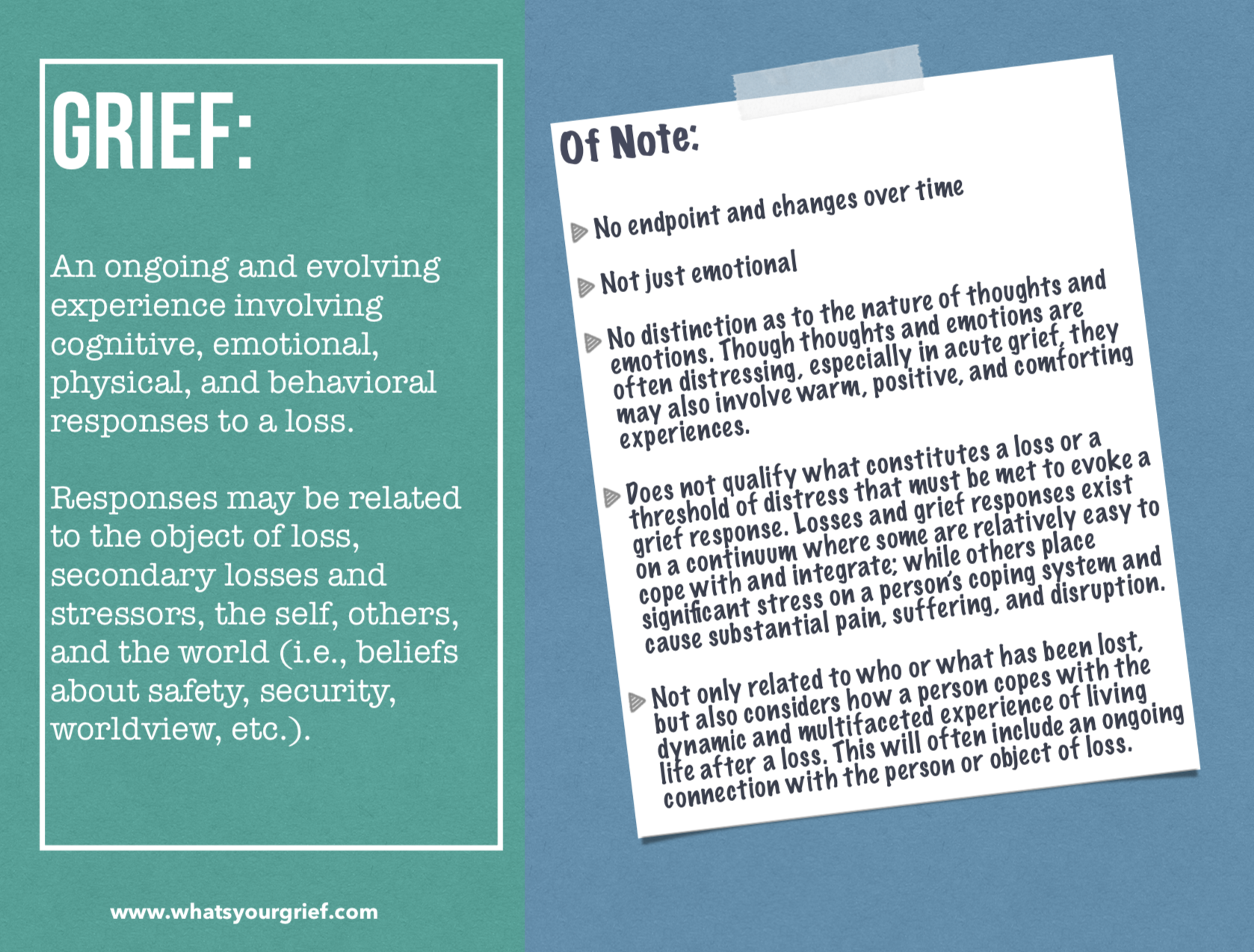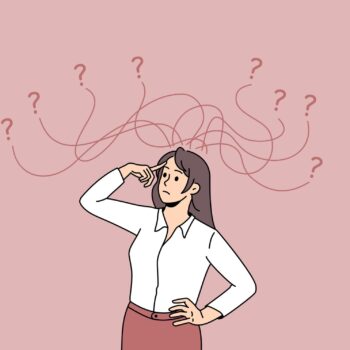WYG's Definition of Grief
/ Understanding Grief : Eleanor Haley
We've written extensively about grief over the years. We've expanded and clarified; we've waxed poetic; and, yes, perhaps we've even pontificated. Though our hope is always to explain and simplify, I sometimes worry that with 555 articles (and rising) averaging around 1,000 words apiece we've achieved the opposite.
Of course, it's okay for people to understand grief differently based on their own experiences. But the challenge is that it's difficult to converse and communicate about concepts (in this instance, grief and loss) when you and your discussion partner are using the same terminology to mean two different things.
When psychologists examine certain concepts in writing, research, and conversation, one of the first things they do is define the concept, so everyone knows they are on the same page. For example, there are many ways of understanding a term like 'intelligence,' so before having a conversation about this construct, psychologists must establish whether they're discussing intelligence as it relates to "street smarts," IQ, aptitude, or any other way of looking at it.
Six years into writing for WYG, we think it's probably time to have a similar conversation about how we define some of the basic terms that we use on a day-to-day basis. It isn't our intent to force our definition of grief on anyone else. However, we think it's crucial that we establish what we mean and what we don't mean when we talk about grief. Especially because, over time, our conceptualization has expanded beyond some of the parameters typically drawn around the grief experience.
What is NOT a part of our definition:
A categorization of what is and is not loss:
Though people commonly believe that grief relates only to the death of a loved one, grief can be experienced in response to all types of losses. Losses can also relate to living people, objects, animals, places, or experiences (like job loss or a loss of faith). To quote grief theorist and researcher Kenneth Doka:
"I think it's probably important to acknowledge and recognize that grief is a reaction to loss. We often confuse it as a reaction to death. It's really just a very natural reaction to loss and so we can experience grief obviously when someone we're attached to dies, but we can also experience it when we lose any significant form of attachment."
Will some loss experiences cause more pain and suffering than others? Absolutely! But grief and loss exist on a continuum. Some losses will result in a grief experience that is relatively easy to cope with and integrate, while others will cause earth-shattering and ongoing grief.
A uniform or predictable pattern:
Many people look at the grief experience as something fixed and rigid. In our Western society, we haven't helped matters by allowing task/stage models to shape our beliefs and attitudes about grief. Though caveat and nuance do often exist within these models, these important distinctions aren't often understood by the wider public.
What those of you who have been through grief know is that it's not predictable and it doesn't follow a pattern. Though it's tempting to try and boil down something as overwhelming as grief into a simple pattern, we think it would do everyone a world of good to try and be more flexible in their understanding of what it means to live life after loss.
A process with a conclusion:
One of the most commonly searched terms related to grief is "grief process." There are several definitions for the word 'process,' and most refer to a series of steps or changes that lead to a specific end.
You could make the argument that we go through the grief process in the same way that we go through the aging process - things change - we change - and we end up somewhere different than where we started. However, it's more likely that people are looking for someone to describe the series of steps and changes that lead to the resolution of grief. Which - good luck.
Okay, so, what is WYG's grief definition:
Now before anyone nitpicks this definition I have to give a big giant caveat that I do not work for Websters. Brevity and summarization are not talents that the authors at WYG possess. So, I'm very sorry to say, our grief definition hovers somewhere between a definition and an incomplete description. I told you defining grief is a difficult task! With that said, here is WYG's definition of grief:
Grief is an ongoing and evolving experience involving cognitive, emotional, physical, and behavioral responses to a loss. Responses may be related to the object of loss, seconary losses and stressors, the self, others, and the world (i.e., beliefs about safety, security, worldview, etc.)

Of course, there are a few caveats, so take a minute to check out the following graphic and then meet me below:
How our definitions may differ:
I mentioned earlier that we sometimes find ourselves at an impasse with readers who have an understanding of grief that is significantly different from the one we've shared above. This may be because many people come here with the belief that grief is something we recover from or the belief that grief is all bad.
Where we differ from this outlook is that we've expanded grief to encompass it all - everything - the whole experience from day 1 to day 14,607. Again, we're not here to say who is right and who is wrong, only to state how we prefer to look at things.
As we've established, we don't believe there is an endpoint to grief and thus it is ongoing. We've also established that we believe grief evolves over time and throughout this evolution, it gains new dimensions that sometimes includes more warm, comforting, and positive thoughts, emotions, memories, and connections.
So, in this way, grief is not all bad and for many, it comes to hold a special place in their lives where they go to honor, connect, remember, and grow throughout their entire lives.
In conclusion:
Logically, a majority of the articles and resources you will find here on WYG discuss the devastating and distressing dimensions of grief. Grief is confusing, grief is overwhelming, and grief can be devastatingly painful and these are the experiences that we, as humans, need the most support getting through.
However, when we started writing about grief way-back-when we promised ourselves we would leave no stone unturned and a major part of this is looking at the experience beyond the parts that have already been explored and mapped out.
So if you come here and you hear us talking about things that you don't often consider in the context of grief - experiences like post-traumatic growth, emotions that are neither (or both) good and bad, grief being an expression of love and ongoing and positive connections with loved ones - this is where we're coming from.
We wrote a book!
After writing online articles for What’s Your Grief
for over a decade, we finally wrote a tangible,
real-life book!
What’s Your Grief? Lists to Help you Through Any Loss is for people experiencing any type of loss. This book discusses some of the most common grief experiences and breaks down psychological concepts to help you understand your thoughts and emotions. It also shares useful coping tools, and helps the reader reflect on their unique relationship with grief and loss.
You can find What’s Your Grief? Lists to Help you Through Any Loss wherever you buy books:





Lisa Bovee August 10, 2019 at 12:22 pm
Thank you for all you do. It’s always tricky to talk about grief and loss (fear about our own mortality is my theory), but you all do it with grace and insight. I like to advise folks to think of the best day they share with their loved one, and when they get sad (obviously, it will happen over and over)…when they become sad, try and think about that “best day.” I hope it can bring a smile through the tear. Big hugs to all. Lisa Bovee
Connie Butler August 8, 2019 at 10:34 am
EXCELLENT!! As a long-time griever (my first experience with death was 30 years ago), I completely relate to the articles and perspective that you have here on WYG. The grief experience does change and it is ongoing… I am thankful to have this place to come where I feel understood and encouraged through all of the devastating losses I have experienced. Thank you for the work you do!!
Mary Andol July 13, 2019 at 7:34 am
Well said. Grief does not have to involve death. It took me a long time to realize that. I think my favorite grief catch phrase is “Grief is not a competition” although I recently heard a one-up “I don’t play Grief Olympics”. So many people do just that, and I suppose it takes a while to realize that loss is relevant to the one who experienced the loss. It still bothers me a bit that people say “I understand” when I am pretty sure that they don’t. When my daughter died, well, you know? Others have attempted to describe child loss and what they say is understood by other parents like me. Still within our ranks are different levels of an indescribable loss. So why does it bother me now that I’ve accepted that a loss is a loss and that loss is relevant? This is why. I would still like to help prepare them for the devastation, but I’ve realized that is impossible. For one thing, it would be impossible to identify my potential audience. For another, I finally realized that the only way to understand this is to experience it firsthand. It cannot be taught. I appreciate your blogs and that you share your insight. I’ve learned from your writings and received validation for other things I already knew. One thing I would like to know more about is the cause of the physical pain that seems to be experienced mostly by parents like me. If doctors had a checklist, maybe they could guide us and prevent some of it. That would remove one more thing from our list of things to worry about. Levi’s Mom.
Marg Hall July 12, 2019 at 9:42 am
Thanks once again for offering support that confirms so many of my concepts of grief and also gives me a guideline to the changes that will happens as time passes since the death of my beloved daughter 21 months ago. Your articles give me strength to carry on with her by my side each and every day. As I move forward ,she keeps me company and gives me the strength to continue to live life.
Edie July 11, 2019 at 6:45 pm
Thank you, Eleanor and Litsa, for this site, which has helped me a lot. I lost my mother four years ago and my father two and a half years ago. So many of the articles here have given me sustenance, food for thought, an articulate reflection of my experiences, or just a feeling of not being alone. The Mary Oliver poem posted recently on the What’s Your Grief Facebook page (‘Heavy’) felt very apposite for me at this juncture.
(‘It’s not the weight you carry
but how you carry it –
books, bricks, grief –
it’s all in the way
you embrace it, balance it, carry it,
when you cannot, and would not,
put it down.
So I went practicing…’)
Thank you both – you are doing really important work.
Laura July 11, 2019 at 7:52 am
This post, like all your posts, speaks to me. Your site is a life-line and has been an important tool for me – along side grief counseling and other supports. I lost my mom in March of 2018 and the grief experiences is truly indescribable; however, your posts (including this one) help give me some words and help me feel like it’s “normal” to feel so incredibly mixed up and forever changed. Thank you so, so much.
Steven July 11, 2019 at 2:31 pm
As humans, we have an internal dialogue which requires words. When it comes to grief, there are some missing words in our English language to describe where we are at. There is always some confusion, being dazed, disconnected, memory loss of some final events, sensory overload, etc. I was sleep walking on the day of the loss of my wife of 44 years, which was both expected and unexpected. I would like to add the phrase “sleep walking” as a description to my grief process immediately after my wife’s death. I made phone calls, I took care of arrangements, I did this and that. A lot of that has been blocked out of my memory, two years later. I was aware of my “sleep walking” as I couldn’t trust that I was a good driver as my mind would race with thoughts as I would drive down the road. I had to discipline myself and say things like “look at the street lights, look at the vehicle in front of you for its brake lights coming on.” Sleep walking. I went to the cemetery a couple of times to make burial arrangements and what I wanted written on the tombstone. I did those things quite competently in retrospect although I did it while sleep walking. I have no memory now of who I spoke with. The graveside service was simple, but wonderful, and I had a lot of input while sleep walking.
As a guy, it is in our DNA to want to fix things. We don’t like to sit idly by without trying to help. So I have to add my thoughts on how to wake up from sleep walking. One is time. Emotional resting, my phrase for coping. I do that the body, mind, and soul recover in time. I regularly give blood to the blood bank, and they will provide a history of your blood pressure, cholesterol level, and other vital signs at the time of donation. I gave blood 8 days after my wife’s death and again a few months later. During my long history of giving blood, my line chart of these medical observations had a few months where I looked unhealthy. One was the one a week after my loss and another was a few months later. That was my physical response where I was wounded the same as if I had been injured in an accident. I had some new personal relationships that looked at being successful, but later floundered and eventually ended. I was trying to fill a loss and at the same time unable to commit to a new relationship. I went to church every Sunday. That was comforting to me. I still continue to go every Sunday, because I find the service uplifting, more so than any other time I can remember. Some sort of spiritual growth. I believe that the word “HOPE” describes the glue that holds me together. Hope is Grief’s enemy. Hope will put Grief back in its box and Time will help nail the lid shut. I should mention my friend Hobby. Hobby is much more than arts and crafts, although I have taken up painting with the supplies I bought as a fluke at the local Micheal’s store. I helped oversee the construction of my son’s new house. I have traveled to New Zealand and Australia. I have held my 3-week old grand niece during her fussing hours. Hobby has helped to nail the lid on the Grief box. I visit the cemetery, preferably alone, as I may spend just a few moments or much longer. I feel compelled to do it. All is well. My soul which used to be bothered by middle of the night gremlins is at peace now. All the medical decisions I had to make including the one to stop treatment of my wife used to bother my soul at 3:30 AM. As a survivor of what some may think of as a nightmare, compassion has grown within me. I give food and money to homeless people despite the criticism that I may be enabling them. My soul says “Do it” while my mind might want to make the more complicated case of I am preventing them from hitting rock bottom where they may finally seek help. I believe in miracles. I met Melinda. Hope and I wanted this to happen and it did. Melinda and I have grown out of the ashes of our losses. She is a widow. We planted trees to represent our former spouses in our nondescript memorial garden. We think of our spouses as candles. The flame went out. A new love is a new candle. The fact that a new candle is burning doesn’t replace the candle where the flame went out. It is beside that candle. My hope is that you may have a new candle in your life, if that is something you want. My spiritual being thanks a higher power for the new gifts in my life. Hope tells me that there are good times ahead, lots of laughter, love, and fulfillment. Time you helped me, thank you. Hobby, you are always my friend, and helped me through many difficult days. Hope, you were the last to show up. Yes, you were a little slow to show up. Time must have told you that it was your turn. I didn’t mention Life. Life tells me to get up everyday and take on the day, whatever it holds. Enjoy the sunshine, enjoy the rain. Keep putting one foot in front of the other. I apologize to those who may have felt my journey doesn’t represent what you are experiencing and my rambling has no value. Let Life introduce you to Hobby, and Time may ease your pain. Perhaps Hope will eventually show up.
Doris July 12, 2019 at 1:51 pm
Thank you Steven!
TJ July 15, 2019 at 12:04 pm
Thank you so much Steven! Your explanation of your journey really speaks to me. I have endeavored to do many of the same activities as you mention and find the journey is evolving daily. I lost my dearest friend and companion a year ago. I have somehow walked through each day, some yes sleep walking. In honor of his one year passing I took a trip to a new place and involving myself in many new activities. I took him along in my heart and would to show him where I am now. I truly believe he walked along with me and enjoyed the journey from a new perspective. Bless you!
BRB July 15, 2019 at 8:14 pm
Steven
I love how you use Hope, Hobby, Life and Time as if they were someone, I can relate to your post tremendously. I also use terms like Grief, Wave, Sorrow and Time as if they were visitors. Just recently wrote down on my journal how Grief moved in and makes a naked appearance when I least expect it… I still have a long road to go until Hope crosses my path but just being able to see emotions and descriptions in a different way tells me my grief journey is changing and maybe someday my life will be beautiful again. I am so happy to read you found someone who understand exactly what its like to lose your partner and not only that but you both embrace their memory. Gives me hope to know maybe someday my candle will light again.
Thank you for sharing steve
Diane Gauss August 19, 2019 at 12:41 pm
Steven,
Thank you for your post. I am just beginning to let hope into my grief journey. I can so relate to the sleepwalking metaphor. I hope someday I can truly remember the sleepwalking journey but I fear just like dreaming some of the sleepwalking journey is permanently lost upon waking. I truly believe that participation in activities, (hobbies in your case) help me to wake up and return to the world beyond grief. I wish you continued happiness and hope!!
Teri Hamilton July 10, 2019 at 3:42 pm
Thank you. I’ve come to your site time and again to read your articles and the responses given. It helps to know we aren’t alone. ??❤️
Jim Santucci July 10, 2019 at 1:26 pm
Fantastic post….having lived the experience of many losses and now working in the field, i believe this is a wonderful articulation of the ‘enigma’ that grief really is. Thank you Lista and Eleanor.
Carol Whitehead July 10, 2019 at 1:20 pm
So timely as I celebrate and mourn my sister, Susan, who is no longer physically here, 3 years on Saturday. I was blessed to find y’all. Your articles, support and guidance has helped me immensely as I walk this unknown path. Deep gratitude for the work you are doing❤?❤